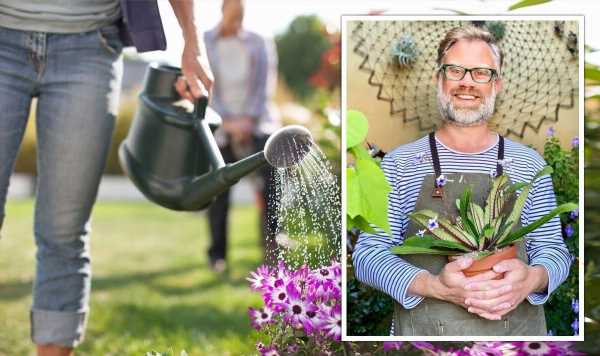BBC Weather: Peak of heatwave set to hit southern parts of UK
We use your sign-up to provide content in ways you’ve consented to and to improve our understanding of you. This may include adverts from us and 3rd parties based on our understanding. You can unsubscribe at any time. More info
Dan Cooper, also known as The Frustrated Gardener, gave Express.co.uk his tips to look after your garden during today’s heatwave. Dan, who has appeared on Gardeners’ World, is the founder of Dan Cooper Garden. His blog has been named number one in the world for flower gardening.
 65% off Sun Lounger
65% off Sun Lounger
Make the most of the heatwave and shop this stellar deal from Wowcher and save 63 percent off a rattan sun lounger. Perfect for any outdoor space, buy before it sells out.
 View Deal Shop now
View Deal Shop now
How to look after your garden in a heatwave
Pots and containers
Pots, containers, and hanging baskets will dry out very quickly during a heatwave and may need watering as often as twice a day.
To reduce the burden, move any that you can into a cool, shady corner until the weather cools down again.
If that’s not possible, water them thoroughly, until water runs out of the drainage holes in the base of the container.
Flower gardens
Hot weather can shorten the life of many flowers, causing them to fade and fall more quickly. Choose early morning or late evening to pick flowers for the house or give to friends – they will last for longer if harvested at cooler times of the day when they are nicely plumped up with water.
Keep on top of deadheading so that flowers do not run to seed prematurely.
Plenty of plants will relish a heatwave provided they’re well watered. You may be surprised how quickly they produce an abundance of flowers in response.
Plants from cooler parts of the world may cease flowering during a heatwave but don’t worry as they’ll pick up again later.

Houseplants
Houseplants on a sunny windowsill will dry out much more quickly during a heatwave – maybe twice as fast or more.
If the surface of the compost is dry to the touch, give them a good drink, even if this breaks your normal watering routine. Unless you are going away on holiday, avoid leaving houseplants standing in a saucer of water for long periods.
Tip away any excess once they’ve soaked up as much as they can. Move houseplants with large, dark-green, or variegated leaves away from sunny windows as the leaves can scorch if they’re exposed to too much sun.
Greenhouses
On hot days open all the windows and doors and sprinkle paths with water regularly – this will improve air circulation, lower the air temperature and increase humidity.
Dry heat encourages red spider mites and powdery mildew so keep the atmosphere cool and fresh. Put up shading if you can or move plants underneath greenhouse staging to give them some shade from the midday sun.
DON’T MISS
Exact time to water your hanging baskets – keep them ‘looking fantastic’ [EXPERT]
Lawn care: Jobs to ‘avoid’ doing during a heatwave [WARNING]
Don’t ‘water lawn daily’ in hot weather – can lead to ‘disease’ [INSIGHT]
Lawns
Water lawns first thing in the morning if you can – avoid having wet grass at night as this promotes the spread of diseases.
The trick is to water so that the grass has time to dry before nightfall. Water thoroughly, until shallow puddles start to appear on the lawn surface and do this every seven to 10 days.
Resist the urge to give lawns a quick sprinkle as this encourages the development of shallow roots that are more vulnerable to drought.
Trees and shrubs
Even large plants may need watering during hot spells, particularly if they’re newly planted.
Give roses, fruit trees and flowering shrubs a good five to 10 litres of water every week if they’re still getting established. Mature trees and shrubs should be able to fend for themselves.

Vegetables and herbs
Hot weather may cause leeks, spinach, lettuce, rocket and parsley to ‘bolt’ (flower and produce seed) sooner than you’d like.
There is not a great deal you can do about this, but planting in light or partial shade and regular watering should help. Harvest vegetables in the morning or evening and avoid the heat of the day.
Wildlife
If water is scarce for plants it’s probably scarce for birds, animals and insects too.
Provide a shallow source of fresh water close to ground level so that bees, butterflies and hedgehogs can drink. If you have a pond, keep it topped up and make sure there are rocks or platforms for insects and animals to climb on to should they accidentally fall in.

Gardeners
Be aware of just how fierce the sun can be in midsummer. Gardening can expose our skin to the sun in areas prone to burning so ensure you apply sunscreen to nose, ears, back of neck, base of back, top of feet and the top of your head.
Take a bottle of water with you everywhere you go and remember to drink it!
Time your gardening activity so you can take advantage of the cool of the morning and balmy evenings and if you start to feel overheated or dizzy, go inside and take a break immediately.
Source: Read Full Article
